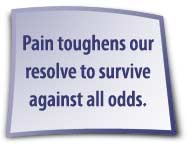 ain is rarely familiar. Each form of pain has its peculiarity, its distinctive flavor, and an echo that is entirely its own. From the dull, throbbing aches of migraines to excruciating birth and death pangs, each has an impact that is distinct. Some forms of pain provoke distress and encapsulate deep, traumatic experiences.
ain is rarely familiar. Each form of pain has its peculiarity, its distinctive flavor, and an echo that is entirely its own. From the dull, throbbing aches of migraines to excruciating birth and death pangs, each has an impact that is distinct. Some forms of pain provoke distress and encapsulate deep, traumatic experiences.
But pain has its flip side. It can awaken a basic instinct in us, toughening our resolve to survive against all odds and propel us forward. Sometimes it is the elixir a person needs to crawl out of the depths of despair and complacence to reach the mountains of excellence and victory. In its extreme, pain becomes a make-or-break instrument, driving us to the edges of despair or inspiring creative genius.
Pain has made extraordinary beings from everyday persons such as Fanny Crosby, who, in spite of her blindness resulting from a doctor’s maltreatment when she was 6 weeks old, produced great hymns of faith that have endured throughout the years. Crosby refused to build an altar to her pain. Instead, she turned her tragedy into a testimony. Her hymns such as “Blessed Assurance” and “He Hideth My Soul” have since inspired millions of people confronting life’s challenges.
She is not alone. Horatio Spafford, author of the hymn “It Is Well With My Soul,” and Louisa Stead forged their songs in the crucible of pain. Out of the depths of his agony at the loss of his daughters in a shipwreck, Spafford composed that well-known hymn. Stead wrote the words of “’Tis So Sweet to Trust in Jesus” after her husband drowned trying to save the life of a boy whose family had gone to a beach for a picnic. Suddenly Stead found herself widowed, broke, and bereaved in a foreign land to which she had migrated in search of a better life. She and her daughter learned by experience to trust in God’s divine provision.
 Sarah Adams was another woman who rose from the ashes of her tragedy to bring joy to millions through her songs. She strove to be an actress until poor health shattered her dream. But in the depths of her despair, God gave her a new perception of her fate, which inspired songs that have brought hope to the broken and beaten.
Sarah Adams was another woman who rose from the ashes of her tragedy to bring joy to millions through her songs. She strove to be an actress until poor health shattered her dream. But in the depths of her despair, God gave her a new perception of her fate, which inspired songs that have brought hope to the broken and beaten.
Pain was the all-too-close companion of thousands of Reformation-era Christians who chose to face death rather than renounce Christ. It brought forth a messiah from Pharaoh’s court through a man called Moses; and in our time, a Nelson Mandela, who was imprisoned for 27 years because of his stand against race inequality and other injustices.
The struggles of these people, and many others, stamped their names in history’s hall of fame. Although some courageous individuals died as unsung heroes, their visions transformed their lone voices into testaments of hope for generations to come.
Lately, I have been asking myself, “What have I done with my pains? Have I allowed them to dominate my mood until they became etched like tribal marks? Or have I taken them as learning tools for sharpening decision-making strategies in the future?”
We can choose to allow our tragedies to either define us or refine us. Those who allow their tragedies to define them often end up living on life’s margins. Their lives become, in the words of David Seamand’s Healing for Damaged Emotions, “a quilt of ‘if onlys’ and ‘ought tos.’”
The reverse would be to allow our pains to refine us. This means we do not carry them like giant chips or crutches, waiting for the right moment to explode. Neither do we suppress them and pretend they don’t exist. We acknowledge our pains. We accept our limits and incapacity in handling them. And we learn to turn them over to God and finally let them go.
If you have been nursing some hurts lately and are struggling to blot out a painful past that has become overwhelming, perhaps you could adopt this ABC approach: Accept that you are hurt. Be willing to forgive. Consider building an altar of praise, an Ebenezer.
A cheerful heart works wonders to the bones. Give joy a chance.
____________
Josephine Akarue is a freelance journalist based in Abidjan, Côte d’Ivoire.

 Sarah Adams was another woman who rose from the ashes of her tragedy to bring joy to millions through her songs. She strove to be an actress until poor health shattered her dream. But in the depths of her despair, God gave her a new perception of her fate, which inspired songs that have brought hope to the broken and beaten.
Sarah Adams was another woman who rose from the ashes of her tragedy to bring joy to millions through her songs. She strove to be an actress until poor health shattered her dream. But in the depths of her despair, God gave her a new perception of her fate, which inspired songs that have brought hope to the broken and beaten.